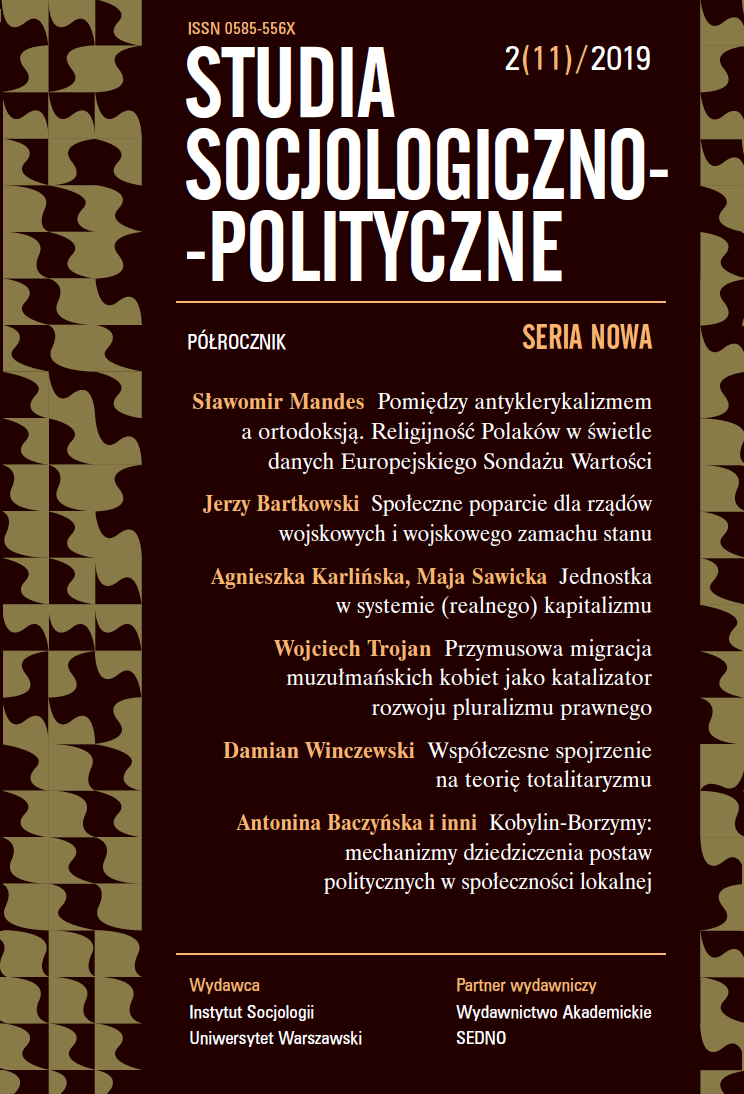Przymusowa migracja muzułmańskich kobiet jako katalizator rozwoju pluralizmu prawnego w ich krajach docelowych na przykładzie poligamicznych związków obywatelek Syrii w Turcji
Forced migration of Muslim women as a catalyst for the development of legal pluralism in their destination countries on the example of polygamous Syrian families in Turkey
Author(s): Wojciech TrojanSubject(s): Politics / Political Sciences, Politics, Social Sciences, Law, Constitution, Jurisprudence, Constitutional Law, Civil Law, Human Rights and Humanitarian Law, Political Theory, Political Sciences, Civil Society, Public Law, Sociology, Politics and law, Politics and religion, Politics and society, Social differentiation, Social Theory, Studies in violence and power, Policy, planning, forecast and speculation, Human Ecology, Sociology of Culture, Migration Studies, Inter-Ethnic Relations, Ethnic Minorities Studies, Social Norms / Social Control, Sociology of Politics, EU-Legislation, Sociology of Law, Identity of Collectives, Peace and Conflict Studies, Sharia Law
Published by: Wydział Socjologii Uniwersytetu Warszawskiego
Keywords: parallel Islam; legal pluralism; polygamy; Syrian women in Turkey; mass migration
Summary/Abstract: Islam provides a perfect environment for the fast development of the Sharia law and the customary laws despite strong secularization efforts and pressure exercised by the government authorities. The Ottoman Empire was a multicultural society based on the principles of the Sharia law. The abolishment of the caliphate in Turkey and enforcement of the monogamy model of a family through the Kemalist revolution penalized the parallel Islam activities. After the collapse of the Ottoman Empire the millet system survived in Syria with its legal pluralism. Polygamy is currently on the rise in Syria as many men left the country or got killed in the fighting. The mass influx of Syrian women to Turkey results in the growth of parallel Islam de facto polygamous marriages in Turkey. The refugee women are looking for protection within the Sharia law family model, and the living law bypassed the Kemalist positive law secular principles. The same trend is visible in the countries that received many Muslim women that were claiming to the UNHCR their well-founded fear of persecution due to alleged transgressing of traditional social mores in their countries of origin. The same individuals sought later support and protection within the informal and effective parallel Islam networks in the resettlement countries. The legal pluralism is on the rise in the traditionally secular cultures due to the mass migration of single women preferred by the selection systems and resettlement criteria as agreed between UNHCR adjudicators and immigration authorities worldwide.
Journal: Studia Socjologiczno-Polityczne. Seria Nowa
- Issue Year: 11/2019
- Issue No: 2
- Page Range: 79-99
- Page Count: 21
- Language: Polish

